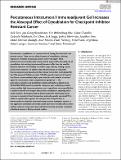Percutaneous Intratumoral Immunoadjuvant Gel Increases the Abscopal Effect of Cryoablation for Checkpoint Inhibitor Resistant Cancer
Author(s)
Som, Avik; Rosenboom, Jan‐Georg; Wehrenberg‐Klee, Eric; Chandler, Alana; Ndakwah, Gabrielle; Chen, Eric; Suggs, Jack; Morimoto, Joshua; Kim, Jonathan; Mustafa, Abdul Rehman; Marcos‐Vidal, Asier; Fintelmann, Florian J.; Basu, Arijit; Langer, Robert; Traverso, Giovanni; Mahmood, Umar; ... Show more Show less
DownloadPublished version (2.478Mb)
Publisher with Creative Commons License
Publisher with Creative Commons License
Creative Commons Attribution
Terms of use
Metadata
Show full item recordAbstract
Percutaneous cryoablation is a common clinical therapy for metastatic and primary cancer. There are rare clinical reports of cryoablation inducing regression of distant metastases, known as the “abscopal” effect. Intratumoral immunoadjuvants may be able to augment the abscopal rate of cryoablation, but existing intratumoral therapies suffer from the need for frequent injections and inability to confirm target delivery, leading to poor clinical trial outcomes. To address these shortcomings, an injectable thermoresponsive gel‐based controlled release formulation is developed for the FDA‐approved Toll‐like‐receptor 7 (TLR7) agonist imiquimod (“Imigel”) that forms a tumor‐resident depot upon injection and contains a contrast agent for visualization under computed tomography (CT). The poly‐lactic‐<jats:italic>co</jats:italic>‐glycolic acid‐polyethylene glycol‐poly‐lactic‐<jats:italic>co</jats:italic>‐glycolic acid (PLGA‐PEG‐PLGA)‐based amphiphilic copolymer gel's underlying micellar nature enables high drug concentration and a logarithmic release profile that is additive with the neo‐antigen release from cryoablation, requiring only a single injection. Rheological testing demonstrated the thermoresponsive increase in viscosity at body temperature and radio‐opacity via microCT. Its ability to significantly augment the abscopal rate of cryoablation is demonstrated in otherwise immunotherapy resistant metastatic tumors in two aggressive colorectal and breast cancer dual tumor models with an all or nothing response, responders generally demonstrating complete regression of bilateral tumors in 90‐day survival studies.
Date issued
2023-11-30Department
Koch Institute for Integrative Cancer Research at MIT; Massachusetts Institute of Technology. Department of Chemical EngineeringJournal
Advanced Healthcare Materials
Publisher
Wiley
Citation
A. Som, J.-G. Rosenboom, E. Wehrenberg-Klee, A. Chandler, G. Ndakwah, E. Chen, J. Suggs, J. Morimoto, J. Kim, A. R. Mustafa, A. Marcos-Vidal, F. J. Fintelmann, A. Basu, R. Langer, G. Traverso, U. Mahmood, Percutaneous Intratumoral Immunoadjuvant Gel Increases the Abscopal Effect of Cryoablation for Checkpoint Inhibitor Resistant Cancer. Adv. Healthcare Mater. 2024, 13, 2301848.
Version: Final published version
ISSN
2192-2640
2192-2659